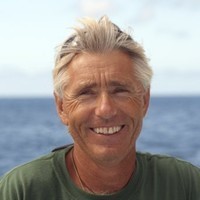Glenn Edney (oceanspirit.org/) is an Ocean ecologist, underwater naturalist, sailor and professional diver. He has been exploring the Ocean and interacting with Ocean life for more than 30 years. He has an MSc in Holistic Science from Schumacher College and Plymouth University UK. His research is focused on understanding the Ocean as a living system and the role she plays as the primary life support system for our planet. He has a strong interest in bringing together traditional indigenous Ocean knowledge and modern scientific ecological understanding. For the past four years he has been collaborating with OceansWatch.org in working with communities in Vanuatu and the Solomon Islands to develop community based, qualitative assessment methodologies to monitor the health of local reefs. He has written three books, including “The Ocean Is Alive“.
In these Sentientist Conversations we talk about the two most important questions: “what’s real?” & “what matters?” Sentientism is “evidence, reason & compassion for all sentient beings.”
As well as the YouTube video, the audio is on our Podcast – subscribe here on Apple and on all the other platforms. Reviews and ratings really help us reach a wider audience – if you think that’s a good thing, you know what to do!
We discuss:
- Ocean ecology
- The ocean as a “living” interconnected system
- First experiencing the ocean at 3 years old and the pervasive presence of the ocean in Aotearoa (New Zealand)
- Growing up in a conservative, farming area
- A dog best friend
- Running away from Sunday School at 5 yrs old. Not being able to get straight answers
- What we think of the natural world has often been heavily modified by humans
- Moving from the country to suburban Auckland. “An environment just for humans”. Sensing the separation of humans.
- Studying fundamentalist Christian churches at university
- Visiting the tomb of St. John the Baptist
- Transcendent experiences of connectedness and continuity, even within a naturalistic worldview
- The physical and spiritual experiences as distinct or as one
- The distinction between reality and the categories we apply to it
- The limits of science
- Collective minds and memory
- The “evolution” of a living ocean as a whole system
- Degrees or levels of sentience
- “Life has always been communal”
- Living things have always communicated sense data about the world (chemically or via other mechanisms). The early origins of sentience
- The deep, pre-human roots of naturalism (engaging with and building “knowledge” about the world)
- Context is critical for life and sentience
- Continuities between early life and human life. We’re not radically separate sorts of entities
- We started out putting humans alone on a pedestal and now we’re realising we’re part of a continuum
- Religious and naturalistic anthropocentrism
- Ethology and neuroethology as tools
- The more we learn, the more animals appear to be sentient
- Fish feel pain and those we’ve tested have self-awareness
- Why focus on pain? Positive experiences matter too
- Fishing for sea bream as a child. Watching them drown on the deck, “silently screaming”
- Being told “Don’t worry son, fish don’t have brains – they can’t feel anything”
- A moral imperative to act with kindness, thoughtfulness & respect for all life and the relationships between living things
- “Life also eats life” as part of a cycle
- Making a personal choice not to kill & therefore not to eat animals
- Do interdependent networks of relations matter directly or because of their importance to individual sentient beings?
- Why so many environmentalists still consume animal products
- The parallels between religious and holistic/systemic thinking. Sometimes causing suffering & death is excused because of some wider “system”
- Protesting against game fishing
- Having compassion even for the people causing harm to other sentients. Engaging with respect
- Compassion doesn’t mean weakness or appeasement
- Positive tipping points in achieving social change (~3-20% of people need to want to change)
- Talking one to one as well as campaigning
- #JustTransition, the Rancher Advocacy Programme & ending animal farming & fishing
- The complexity of ecosystems & the risks of human intervention
- Exploring, questioning, improving
- Human exceptionalism & dominance ends up harming humans
- A naive reverence for nature ignores the suffering it involves
- A sense of transcendent connection with a whale and her calf
- Dominate, withdraw or recognise our role and act with compassion?
- Sentience & intellect combined are a powerful way of being
- “Active hope”
Sentientism is “Evidence, reason & compassion for all sentient beings.” More at Sentientism.info. Join our “wall” using this simple form.
Everyone interested, Sentientist or not, is welcome to join our groups. Our main one is here on FaceBook. We have people from over 90 countries there so far.
Thanks to Graham for his post-prod work. Follow him @cgbessellieu.

